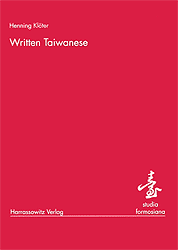The government of China’s Fujian Province is calling for official suppression of the use of languages other than Mandarin, though Mandarin is not native to that region, and for Chinese characters to be seen as more important than Pinyin and foreign languages.
The scope of this is about as broad as I’ve ever seen. The basics are roughly these:
- Thou shalt not write in Sinitic languages other than Mandarin and in other than officially standard characters.
- Thou shalt not even speak thy mother tongue, if it be not Mandarin, at work in the broadly defined public sphere other than in a few limited contexts.
- Thou shalt have no other script lest thou also employ Chinese characters, which must be made larger than all others.
Wǒ shěng lìfǎ guīfàn yǔyán wénzì, xiāngguān bànfǎ cǎo’àn tíjiāo shěng Rén-Dà chángwěihuì shěnyì
《Fújiàn shěng shíshī 《Zhōnghuá Rénmín Gònghéguó tōngyòng yǔyán wénzì fǎ》 bànfǎ》 (cǎo’àn) zuórì tíjiāo shěng 10 jiè Rén-Dà chángwěihuì dì 20 cì huìyì shěnyì. Zhè bù dìfāngxìng fǎguī (cǎo’àn) míngquè guīdìng, guójiā jīguān gōngzuò rényuán zài bàngōng, huìyì, miànduì shèhuì gōngkāi jiǎnghuà děng gōngwù huódòng shí yīngdāng shǐyòng Pǔtōnghuà.
Bànfǎ (cǎo’àn) lièchū le tuīguǎng Pǔtōnghuà hé tuīxíng guīfàn Hànzì de 4 dà zhòngdiǎn lǐngyù:
(yī) guójiā jīguān gōngwù yòngyǔ yòngzì;
(èr) jiàoyù jīgòu de jiàoyù jiàoxué yòngyǔ yòngzì;
(sān) dàzhòng méitǐ, Hànyǔ wén chūbǎnwù, xìnxī jìshù chǎnpǐn de yòngyǔ yòngzì;
(sì) gōnggòng fúwù hángyè, gōnggòng chǎngsuǒ de yòngyǔ yòngzì.Bànfǎ (cǎo’àn) guīdìng, xuéxiào jí qítā jiàoyù jīgòu yǐ Pǔtōnghuà wèi jīběn de jiàoyù jiàoxué yòngyǔ. Guǎngbō diàntái, diànshìtái de bōyīn, zhǔchí hé cǎifǎng, yǐng-shì, Hànyǔ wén yīnxiàng diànzǐ chūbǎnwù yīngdāng shǐyòng Pǔtōnghuà. Shāngyè, jīnróng, lǚyóu, wénhuà, tǐyù, yīliáo wèishēng, tiělù, mínháng, chéngshì jiāotōng, yóuzhèng, diànxìn, bǎoxiǎn děng gōnggòng fúwù hángyè, yǐjí gèlèi huìyì, zhǎnlǎn, dàxíng huódòng de fāyánrén, jiěshuōyuán yīngdāng yǐ Pǔtōnghuà wèi jīběn gōngzuò yòngyǔ. Tóngshí guīdìng, zài zhíxíng gōngwù shí yùdào wúfǎ yòng Pǔtōnghuà jìnxíng jiāoliú de duìxiàng shí, jīng pīzhǔn shǐyòng fāngyán bōyīn de shěng nèi guǎngbō, diànshìtái de yǒuguān jiémù yòngyǔ, kěyǐ bù shǐyòng Pǔtōnghuà. Duì Xiāng Gǎng, Àomén, Táiwān tóngbāo yǐjí Qiáobāo de liánluò hé jiēdài, yǔ Xiāng Gǎng, Àomén tèbié xíngzhèngqū hé Táiwān dìqū jīngjì, wénhuà, jiàoyù, kējì, tǐyù, wèishēng děng lǐngyù de jiāoliú huódòng, gēnjù xūyào kě[yǐ] shǐyòng xiāngguān fāngyán. Dìfang xìqǔ, fāngyán gēqǔ děng shǔyú mínzú mínjiān chuántǒng wénhuà bǎohù de huódòng yǐjí fāngyán yánjiū kě[yǐ] shǐyòng fāngyán.
Zài guīfàn yòngzì fāngmiàn, bànfǎ (cǎo’àn) guīdìng, guójiā jīguān de gōngwù yòngzì, yǐng-shì píngmù yòngzì, gōnggòng fúwù hángyè yòngzì, Hànyǔ wén chūbǎnwù, dìmíng, jiànzhùwù biāozhì děng yòngzì yīngdāng shǐyòng guīfàn Hànzì. Rénmíng yòngzì yīngdāng fúhé guójiā Hànzì rénmíng guīfàn hé gōng’ān jīguān yǒuguān guīdìng.
Zài gōnggòng chǎngsuǒ de yòngzì bùdé dāndú shǐyòng wàiguó wénzì huò Hànyǔ Pīnyīn. Xūyào pèihé shǐyòng wàiguó wénzì huò Hànyǔ Pīnyīn de, yīngdāng cǎiyòng yǐ guīfàn Hànzì wéizhǔ, wàiguó wénzì huò Hànyǔ Pīnyīn wèi fǔ de xíngshì, guīfàn Hànzì de zìtǐ yīng dàyú wàiguó wénzì huò Hànyǔ Pīnyīn; wàiguó wénzì jí yìwén huò Hànyǔ Pīnyīn yào zuòdào guīfàn hé biāozhǔn.
我省立法规范语言文字,相关办法草案提交省人大常委会审议
本报福州讯 (记者 田家鹏)《福建省实施《中华人民共和国通用语言文字法》办法》(草案)昨日提交省十届人大常委会第二十次会议审议。这部地方性法规(草案)明确规定,国家机关工作人员在办公、会议、面对社会公开讲话等公务活动时应当使用普通话。
办法(草案)列出了推广普通话和推行规范汉字的四大重点领域:
(一)国家机关公务用语用字;
(二)教育机构的教育教学用语用字;
(三)大众媒体、汉语文出版物、信息技术产品的用语用字;
(四)公共服务行业、公共场所的用语用字。办法(草案)规定,学校及其他教育机构以普通话为基本的教育教学用语。广播电台、电视台的播音、主持和采访,影视,汉语文音像电子出版物应当使用普通话。商业、金融、旅游、文化、体育、医疗卫生、铁路、民航、城市交通、邮政、电信、保险等公共服务行业,以及各类会议、展览、大型活动的发言人、解说员应当以普通话为基本工作用语。同时规定,在执行公务时遇到无法用普通话进行交流的对象时,经批准使用方言播音的省内广播、电视台的有关节目用语,可以不使用普通话。对香港、澳门、台湾同胞以及侨胞的联络和接待,与香港、澳门特别行政区和台湾地区经济、文化、教育、科技、体育、卫生等领域的交流活动,根据需要可使用相关方言。地方戏曲、方言歌曲等属于民族民间传统文化保护的活动以及方言研究可使用方言。
在规范用字方面,办法(草案)规定,国家机关的公务用字、影视屏幕用字、公共服务行业用字、汉语文出版物、地名、建筑物标志等用字应当使用规范汉字。人名用字应当符合国家汉字人名规范和公安机关有关规定。
在公共场所的用字不得单独使用外国文字或汉语拼音。需要配合使用外国文字或汉语拼音的,应当采用以规范汉字为主、外国文字或汉语拼音为辅的形式,规范汉字的字体应大于外国文字或汉语拼音;外国文字及译文或汉语拼音要做到规范和标准。
source: Gōngwùyuán bàngōng kāihuì yàoshuō Pǔtōnghuà (公务员办公开会要说普通话), Xiàmén Rìbào, November 16, 2005. I first spotted this at What’s On Xiamen.

